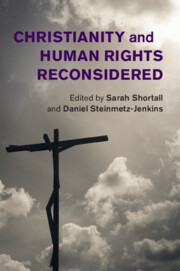Book contents
- Christianity and Human Rights Reconsidered
- Human Rights in History
- Christianity and Human Rights Reconsidered
- Copyright page
- Contents
- Figures
- Contributors
- Preface
- Acknowledgments
- Introduction
- Part I General Reflections
- Part II European Catholicism and Human Rights
- Part III American Protestant Trajectories
- Part IV Beyond Europe and North America
- 10 On Chinese Rites and Rights
- 11 “Expert in Humanity”
- 12 Neoliberalism, Human Rights, and the Theology of Liberation in Latin America
- 13 Two Sudans, Human Rights, and the Afterlives of St. Josephine Bakhita
- Index
13 - Two Sudans, Human Rights, and the Afterlives of St. Josephine Bakhita
from Part IV - Beyond Europe and North America
Published online by Cambridge University Press: 26 September 2020
- Christianity and Human Rights Reconsidered
- Human Rights in History
- Christianity and Human Rights Reconsidered
- Copyright page
- Contents
- Figures
- Contributors
- Preface
- Acknowledgments
- Introduction
- Part I General Reflections
- Part II European Catholicism and Human Rights
- Part III American Protestant Trajectories
- Part IV Beyond Europe and North America
- 10 On Chinese Rites and Rights
- 11 “Expert in Humanity”
- 12 Neoliberalism, Human Rights, and the Theology of Liberation in Latin America
- 13 Two Sudans, Human Rights, and the Afterlives of St. Josephine Bakhita
- Index
Summary
Sudanese national governments have attempted to forge Sudan as an Islamic state for much of its postcolonial history. Southern Sudan, with its long exposure to Christian mission work, rejected this agenda and waged two civil wars against the state. Josephine Bakhita, Sudan’s first Catholic saint, stood at the epicenter of this maelstrom. This chapter investigates Bakhita’s sociopolitical significance in recent Sudanese (and South Sudanese) history. Born in the nineteenth century, Bakhita was enslaved in her youth but, once free, eventually became a Canossian sister. Pope John Paul II injected her life and legacy into calls for human dignity to be respected in a context rife with abuses that included slavery and religious persecution. Her name continued to carry resonance after the war through Radio Bakhita, a station that became linked with attacks on expressive freedom. Bakhita’s afterlife shows how a religious figure can be injected into campaigns against secular social ills and become a symbol linked to different abuses in the same space in different times.
- Type
- Chapter
- Information
- Christianity and Human Rights Reconsidered , pp. 261 - 275Publisher: Cambridge University PressPrint publication year: 2020

